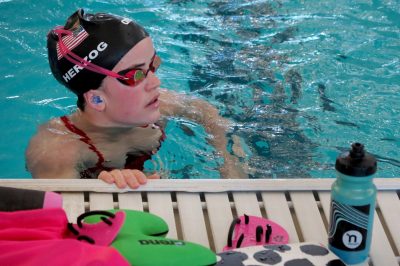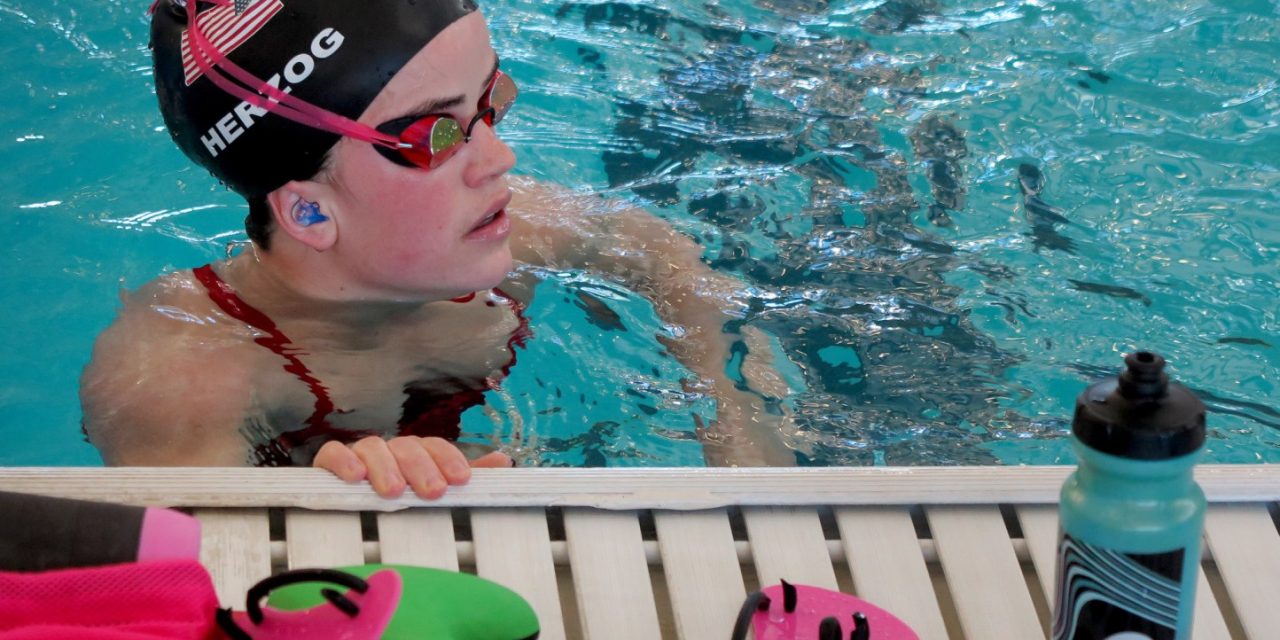Sophia Herzog swims at the Salida Hot Springs Aquatic Center 10 times a week, resting only on Sundays.
The pool is her office and just about the only other regular commitment her schedule allows for is walking her black cattle dog mix, Odie. It’s an odd place to train for one of the fastest and most elite Paralympic swimmers alive.
Herzog, 23, won silver in the 100-meter breaststroke at the 2016 games in Rio de Janeiro, Brazil. Now she spends her days battling local high school teenagers in the pool to keep her fitness up.

Paralympic silver medalist Sophia Herzog awaits instructions during a workout at the Salida Hot Springs Aquatic Center on Feb. 23, 2021.
After the devastating postponement of the 2020 Tokyo games due to the COVID-19 pandemic, Herzog now joins top athletes all over the world who are working to maintain the physical and mental focus required to compete on the highest level — despite fears it will all be canceled again.
That seemed a real possibility earlier this year, following survey results showing 80 percent of the Japanese population wanted the games delayed a second time or shut down altogether. Lately, it’s seeming more like both the Olympic and Paralympic competitions will indeed happen, though visiting fans from foreign nations may be stopped at the gate.
For now, the games are still on — slated to start in late August.
Showing Promise
Herzog grew up in the small town of Fairplay and said she was the first child with a physical disability in her school district.
Born to parents of average height, Herzog has a form of dwarfism known as achondroplasia. Herzog’s parents exposed her to sports early and she joined her first swim club team by age 10.
Living close to the Olympic Training Center in Colorado Springs was a key ingredient to her success: It allowed her to see, aspire to, and follow the path of a professional swimmer.
She improved enough to move to the training center and swim full-time at 17, where she prepared for the 2016 Paralympics in Rio de Janeiro, Brazil. She ultimately placed sixth in the 200-meter IM and won a silver medal in the 100-meter breaststroke.
After five years of competing and living at the training center, Herzog felt her life needed more balance. In 2019, she moved to Salida with her boyfriend and hired Salida High School swim coach Wendy Gorie to coach her privately at the local pool.
“I swim here and then I go home,” Herzog said. “And it’s really nice to just detach from swimming and do my stuff with my dog and not just be getting blasted with swimming 24/7.”
Breaking Down
On top of her swim workouts, Herzog also does strength training at a Salida gym three times a week. All that training has given her physique a tight and muscular look, complete with protruding biceps and six-pack abs.
“She is ripped and she’s lifting on a much higher level than my [high school] girls are,” Gorie said. She added that while Herzog may often be slower in the pool than some members of the team, they have measured and discovered Herzog needs two and a half times as many strokes to swim the same distance as most of the high schoolers.
An All-American college swimmer at one time herself, Gorie coached at the high school level in Houston, TX for years before she and her husband retired to Salida in 2011. Gorie said she is feeling the intense pressure of Tokyo as well. Coaching a top-level swimmer in the 21st century involves science and technical precision. While watching her in the pool on a recent Tuesday, Gorie said she’s moving Herzog into most difficult parts of her training, where she works to purposefully break her muscles down for months.
“Within a couple weeks before the games, we’ll start letting up dramatically,” Gorie said. “So that when she hits the games, hopefully she’ll be at her peak performance.”
Loving It Again
The unusual situation Herzog has crafted in Salida has actually led her to find a new passion for her sport, and she has embraced a new mentorship role among her teenage teammates.
“She’s really motivated, and her work ethic is awesome,” said sophomore varsity swimmer, Ember Hill. “She never takes breaks, she’s here at every practice, she keeps the intervals and she stays with us.”
Herzog said racing daily against the rest of the swim team is very appropriate training. She said some of her Paralympic competitors are just as fast as the able-bodied high school swimmers she’s up against.
“So I need to keep up with them,” Herzog said of the varsity swimmers. “They’re the standard that I need to hold for myself.”
It’s been helpful, in an environment where the pandemic has shut down official competition for more than a year.
Last month, during a high school swim meet, she broke two American Paralympic records. Even with that, it’s just tough to know where she stands.
“I just haven’t had the official markers. But, unofficially, I think I’m way better [than in 2016],” Herzog said. “I’m also older, so I know how to swim a little bit smarter — and train smarter.”
By Dan Boyce, CPR News
Ark Valley Voice and Colorado Public Radio are both members of the Colorado News Collaborative.








Recent Comments